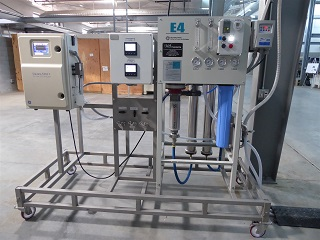
Reusing rainwater, rather than pulling freshwater from the aquifer, the pilot project offers an original way to supply the wash water in winemaking.
GE’s Water & Process Technologies provided a reverse osmosis (RO) system and a Total Organic Carbon (TOC) analyzer to the winery at UC Davis as an inventive way to use existing technologies with advanced digital capabilities for a new application. The pilot enables the winery at UC Davis to have more control over its source water by not having to rely on the aquifer with its varying water quality and availability.
Jill D. Brigham from the Sustainable Wine and Food Processing Center, University of California, Davis, said that rainwater is cleaner than groundwater sources, as it doesn’t contain as much mineral content—that makes filtering the water easier.
The rainwater is collected from the roof of the Jess S. Jackson Sustainable Winery Building and other campus buildings. It then goes through the treatment system so that it can be used to clean the tanks and equipment at the winery. About 7,000 gallons per day of water are treated for use in the winery.
The rainwater capturing system transports the rainwater through downspouts to a holding tank with a capacity of 1,200 gallons. After going through a 50-micron media filter, it is pumped into two 45,000-gallon storage tanks that feed the water treatment system.
Rainwater inherently has fewer contaminants than traditional municipal water sources like rivers, lakes and groundwater. This also reduces overall treatment costs making the process more environmentally friendly, sustainable and cost-effective.
Water & Process Technologies’ RO system purifies the rainwater to a potable level and removes contaminants such as pesticides, herbicides, viruses, toxins, dust, pollen, bacteria and pollution.


